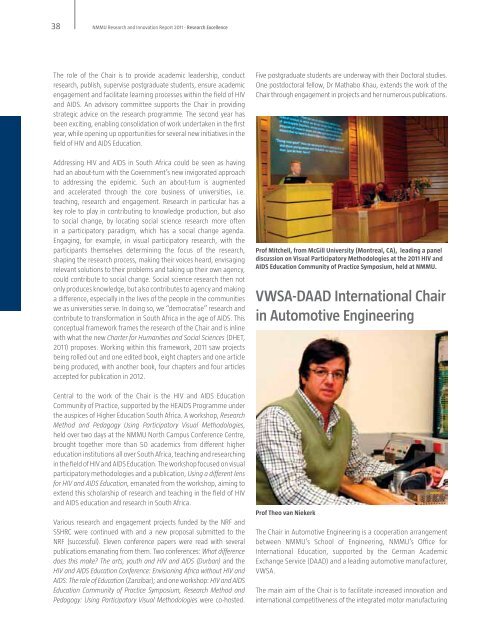2011-NMMU-Research-Report - Research Management - Nelson ...
2011-NMMU-Research-Report - Research Management - Nelson ...
2011-NMMU-Research-Report - Research Management - Nelson ...
You also want an ePaper? Increase the reach of your titles
YUMPU automatically turns print PDFs into web optimized ePapers that Google loves.
38<br />
<strong>NMMU</strong> <strong>Research</strong> and Innovation <strong>Report</strong> <strong>2011</strong> - <strong>Research</strong> Excellence<br />
The role of the Chair is to provide academic leadership, conduct<br />
research, publish, supervise postgraduate students, ensure academic<br />
engagement and facilitate learning processes within the field of HIV<br />
and AIDS. An advisory committee supports the Chair in providing<br />
strategic advice on the research programme. The second year has<br />
been exciting, enabling consolidation of work undertaken in the first<br />
year, while opening up opportunities for several new initiatives in the<br />
field of HIV and AIDS Education.<br />
Addressing HIV and AIDS in South Africa could be seen as having<br />
had an about-turn with the Government’s new invigorated approach<br />
to addressing the epidemic. Such an about-turn is augmented<br />
and accelerated through the core business of universities, i.e.<br />
teaching, research and engagement. <strong>Research</strong> in particular has a<br />
key role to play in contributing to knowledge production, but also<br />
to social change, by locating social science research more often<br />
in a participatory paradigm, which has a social change agenda.<br />
Engaging, for example, in visual participatory research, with the<br />
participants themselves determining the focus of the research,<br />
shaping the research process, making their voices heard, envisaging<br />
relevant solutions to their problems and taking up their own agency,<br />
could contribute to social change. Social science research then not<br />
only produces knowledge, but also contributes to agency and making<br />
a difference, especially in the lives of the people in the communities<br />
we as universities serve. In doing so, we “democratise” research and<br />
contribute to transformation in South Africa in the age of AIDS. This<br />
conceptual framework frames the research of the Chair and is inline<br />
with what the new Charter for Humanities and Social Sciences (DHET,<br />
<strong>2011</strong>) proposes. Working within this framework, <strong>2011</strong> saw projects<br />
being rolled out and one edited book, eight chapters and one article<br />
being produced, with another book, four chapters and four articles<br />
accepted for publication in 2012.<br />
Central to the work of the Chair is the HIV and AIDS Education<br />
Community of Practice, supported by the HEAIDS Programme under<br />
the auspices of Higher Education South Africa. A workshop, <strong>Research</strong><br />
Method and Pedagogy Using Participatory Visual Methodologies,<br />
held over two days at the <strong>NMMU</strong> North Campus Conference Centre,<br />
brought together more than 50 academics from different higher<br />
education institutions all over South Africa, teaching and researching<br />
in the field of HIV and AIDS Education. The workshop focused on visual<br />
participatory methodologies and a publication, Using a different lens<br />
for HIV and AIDS Education, emanated from the workshop, aiming to<br />
extend this scholarship of research and teaching in the field of HIV<br />
and AIDS education and research in South Africa.<br />
Various research and engagement projects funded by the NRF and<br />
SSHRC were continued with and a new proposal submitted to the<br />
NRF (successful). Eleven conference papers were read with several<br />
publications emanating from them. Two conferences: What difference<br />
does this make? The arts, youth and HIV and AIDS (Durban) and the<br />
HIV and AIDS Education Conference: Envisioning Africa without HIV and<br />
AIDS: The role of Education (Zanzibar); and one workshop: HIV and AIDS<br />
Education Community of Practice Symposium, <strong>Research</strong> Method and<br />
Pedagogy: Using Participatory Visual Methodologies were co-hosted.<br />
Five postgraduate students are underway with their Doctoral studies.<br />
One postdoctoral fellow, Dr Mathabo Khau, extends the work of the<br />
Chair through engagement in projects and her numerous publications.<br />
Prof Mitchell, from McGill University (Montreal, CA), leading a panel<br />
discussion on Visual Participatory Methodologies at the <strong>2011</strong> HIV and<br />
AIDS Education Community of Practice Symposium, held at <strong>NMMU</strong>.<br />
VWSA-DAAD International Chair<br />
in Automotive Engineering<br />
Prof Theo van Niekerk<br />
The Chair in Automotive Engineering is a cooperation arrangement<br />
between <strong>NMMU</strong>’s School of Engineering, <strong>NMMU</strong>’s Office for<br />
International Education, supported by the German Academic<br />
Exchange Service (DAAD) and a leading automotive manufacturer,<br />
VWSA.<br />
The main aim of the Chair is to facilitate increased innovation and<br />
international competitiveness of the integrated motor manufacturing


